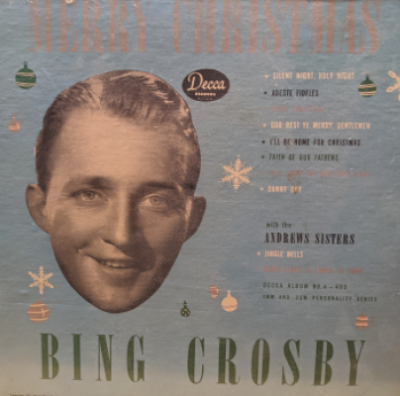.
.

The editor’s copy of Decca’s 1947 album Merry Christmas, which featured Irving Berlin’s “White Christmas”
.
___
.
December’s Music
by Paul Brophy
.
…..It’s December and that music is here again.
…..In late November we celebrate Thanksgiving, pausing to express our gratitude for all that we have. Then comes December and we get back to normal—we want more again. Kids want Santa to bring them toys and goodies. Adults want chestnuts roasting on an open fire, jingle bells, silver bells, sleigh bells, and a holly jolly Christmas.
…..And then there’s the ultimate December wish—a white Christmas.
…..Irving Berlin was in Los Angeles in 1940 and longing for the North when he wrote “White Christmas.” He knew he had something special, but even he didn’t understand the depth and breadth of it. Bing Crosby recorded it in 1942 and it became a big hit—a partnership between the era’s most prolific and popular songwriter and its biggest star.
…..The song grabbed at the hearts of GIs during WWII—the sailors, soldiers, nurses and others far away from home. Maybe less so guys like my WWII veteran friend Jack, who, while stationed in the snowy Aleutian Islands, threw his boot at the radio playing the song, or the poor souls fighting the Battle of the Bulge—their bloody white Christmas. And it still undoubtedly tugs the hearts of GIs in Iraq and Afghanistan and elsewhere around the globe.
…..Bing’s recording of “White Christmas” is the biggest selling single of all time…over 50 million copies. The song endures because it’s our secular hymn about times past.
…..It is nostalgia for what once was, and what we imagine might have been, once upon a time. Maybe longing for what never was is the sweetest form of nostalgia.
…..December captures the wish for a sweet past, real and imagined.
…..The year grandpa gave you a puppy and, because she ate half of your sister’s hand-crafted gingerbread house, you named her Ginger.
…..That Christmas on the farm when your daughter, on her first birthday, walked across the living room all by herself to the cheers of Aunt Harriet and Uncle Will.
…..That December walk in Central Park when he said, “I love you,” and you said, “I love you, too.” You knew your life had changed forever.
…..That Chanukah in your tiny apartment when you and David were lighting your first Menorah, and you put his hand on your tummy to tell him you were pregnant. And, after a brief blank stare, he smiled and said, “I hope it’s a girl and that she’s as beautiful as you.”
…..That day when you and your new love walked home with your first Christmas tree on a sled, decorated it, and drank hot chocolate before a fire, listened to Nat Cole’s “The Christmas Song,” and you felt the deepest coziness of your life.
…..All of these wished-for pasts: a little drummer boy, a silent night, angels singing to shepherds, “Glory to God in the Highest and Peace to All on Earth,” a “White Christmas.”
…..Berlin has captured the primeval gift that December brings to us in its winter darkness, when we yearn for simpler times, more beautiful, more sacred than we can possibly experience in the here and now. We’re not just dreaming of a “White Christmas,” we’re dreaming of better yesterdays.
.
.
___
.
.

Paul Brophy is a Baltimore-based writer with a soft spot in his heart for World War II-era music.
.
.
.
While Crosby’s version of “White Christmas” has sold over 50 million copies around the world, other versions have also proved to be very popular. It is estimated that all versions of this song have sold over 100 million copies.
One of the earliest versions was by Gordon Jenkins and his Orchestra, which reached #16 on the Billboard pop singles chart in 1942. You can listen to it here.
.
.
.
.




























